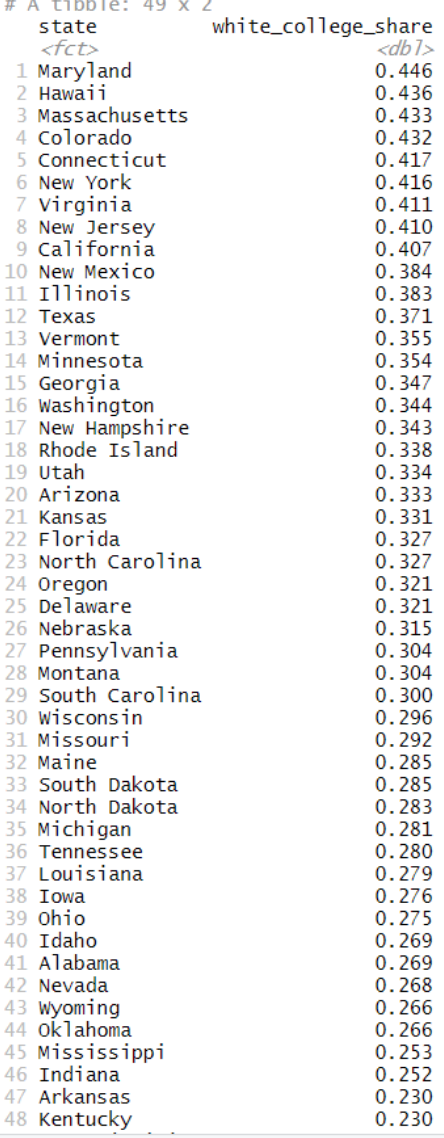
Julius Probst directed me to a list of the share of whites that are college educated in various states. (See the list at the bottom of the post.) Note that the 10 states with the highest college share all voted for Joe Biden, as well as 8 of the next 10. Only Texas and Utah were exceptions, at #12 and #19.
At first glance the explanation seems obvious; white college grads voted strongly for Biden. I believe that’s only part of the explanation; they actually didn’t vote all that overwhelmingly for Biden. Rather, college grads also reshape the broader society in a way that is friendlier to the modern Democratic Party.
When I was young, middle class people would mow their own lawns. As time went by, the “middle class” tended to segment into the upper middle class and the working class, with different lifestyles. Working class people still cut their grass, while upper middle class people frequently hire others to do so, often immigrants from Latin America. Perhaps white people who cut their own grass tend to vote for Donald Trump, while those that hire others vote for Biden, as do the people they hire.
More broadly, in upper middle class areas there’s been an explosion in service industries, everything from pet grooming to nail salons to full service car washes. Many working class immigrant people migrate to affluent professional cites, where they provide services to upper middle class professionals. And while Hispanics shifted slightly toward Trump in the latest election, in absolute terms they still voted overwhelmingly for Biden.
The symbiotic relationship between affluent professions and the immigrant communities that provide services to them creates a very different society from what you see in more “self-sufficient” working class states like Kentucky and Arkansas (the bottom two states on the list.) Indeed if you look at the bottom ten states, only one voted for Biden.
And that one exception–Nevada– is itself very interesting. Biden won Nevada because of strong support among Hispanic voters. While Nevada does not have a big group of college educated whites, it does have a huge tourist industry, catering to affluent travelers. Thus it has lots of the same low-skilled service jobs that you see in places like California, and the immigrant population to match.
This idea is familiar to those who have studied racial politics in America. States with large (but minority) black populations such as Mississippi, Alabama, Louisiana, South Carolina, and Georgia mostly voted for Trump. But that’s not because lots of blacks voted for Trump. Rather having a large black population reshapes society. It makes the non-blacks behave differently, more likely to vote overwhelmingly for the candidate that blacks are not voting for. In contrast, whites in Vermont probably don’t think about the preferences of their tiny black population when casting their ballots.
The states full of affluent whites and large immigrant populations are likely to be relatively open to immigration, trade, specialization, etc. They will also tend to be more urban. This creates a dilemma for Democrats. How can they appeal to this group, and also to the factory workers to whom Bernie Sanders was trying to appeal (albeit not necessarily successfully?) America is too complex a society for either political party to have a neat and tidy solution to coalition building in a two party structure. There will always be strange bedfellows. Furthermore, as society changes over time, the parties will evolve into new and different coalitions. For the moment, the Dems are the “college plus minorities” party. Who knows what they’ll be in 50 years?


READER COMMENTS
Alan Goldhammer
Nov 18 2020 at 6:58pm
I went to grad school at Indiana and was surprised to see it so low on the list. There are a lot of colleges in the state aside from Purdue and IU.
JK Brown
Nov 19 2020 at 1:34am
This is partially correct. So many college students and subsequent graduates have very little pre-college job experience these days. Never had to make their own monthly bills, even if just their car insurance and gas, until their mid-20s or so. This seems to exacerbate the wide opinion of the “educated strata” being gullible. Todays grads have very little “hands-on” work experience to ground them against the ease with which the mind can be fooled. Mowing your own yard, better yet knowing how to fix your own lawnmower as was common 40 years ago, gives one perspective. Better yet, is growing a garden and learning about planning, waiting with hope, the impact of pest and weather wiping those hopes out. Waiting years for a fruit tree/bush to come into bearing. With a bit of thought the gardener might get a sense of how it would be if that garden food was critical to your eating now or through the winter.
Today’s college graduate is an easy mark as many don’t know where meat or electricity comes from beyond the supermarket or wall plug and often have no idea of those who keep the lights on, the water flowing, the waste disposed of.
A few quotes on the “educated strata”:
robc
Nov 20 2020 at 9:57am
Lewis was brilliant.
That Hideous Strength gave me nightmares.
Thomas Hutcheson
Nov 21 2020 at 6:25am
You’d think it would work that way, but it’s people of my age (early boomer) that fell for Trump’s birtherism, anti-immigration, trade wars, ACC denial, deficits to finance tax transfers to the rich. Go figure.
Q-Anon does seem to skew young, however; I have not seen anything about their educational status
Grand Rapids Mike
Nov 19 2020 at 8:26am
The following are my rambling comments on the subject.
To start, I’m an old guy. Grew up cutting grass, raking leaves and shoveling snow at home and for neighbors to make a few bucks. Later paid my way through college by working in factories and driving school bus etc. Another benefit of growing upin the 50’s, 60’s and 70’s is that it was possible to fix your own car. Fixing your own car one learn about how things work, and that by itself can be a useful training ground. Anyways finished college with Masters in Econ, followed with Masters in Operation Research while working. I still cut my own grass etc. Neighbors mostly hire someone, usually hispanic nationality. My work ethic and econ education partially made me out of sink with the Dems.
As a side note, must admit I see an entrepeneural spirit in those involved in the lawn maintenance business. It’s interesting to observe the adoption of more sophisticated lawn equipment ie capital to maximize the labor output. My guess is that children of these workers will grow up more attuned to life and hard work and what it takes to achieve success.
Getting with the 2 party structure and how people vote with more education. While my parents were Democrats, I left a long time ago. Or should I say the Democrats left me. Besides my core philosophy, I am a pro life and the Dems are all about abortion. No matter how you cut it or try to hide it, that’s the core Dem idea. Also the concept of giving people more and more free stuff, while taxing work has significant diminishing returns. Too much free stuff is not good for individual responsibility and the country. Kids whose college is paid by parents, or someone else promotes a client, please take care of me mentality.
David H Levey
Nov 19 2020 at 8:46am
A minor correction: The list cuts off two states at the bottom, which — by process of elimination — have to be Alaska and W. Virginia. As Trump states, they are consistent with the pattern.
David H Levey
Nov 19 2020 at 8:56am
Some other observations based on the list: The high (and rising) share of the college-educated in Texas explains why that state is trending “purple,” the medial position of Wisconsin, Michigan, and Pennsylvania corresponds to their “battleground” status, and Utah is an exception because of the dominance of its culturally conservative educated Mormon population.
Scott Sumner
Nov 19 2020 at 12:44pm
David, Thanks for the correction. And very good points.
Floccina
Nov 19 2020 at 1:20pm
1. I’m surprised by the range.
2. I’m surprised ND is not near to the top.
3. I’m still surprised at how differently VT (66% Biden) and ND (65% Trump) vote. My current assumption is becomes part of state identity to vote democrat or Republican, like cheering for the local teams.
Scott Sumner
Nov 19 2020 at 3:29pm
Those two states are also at extremes regarding Covid rates in recent months.
robc
Nov 20 2020 at 9:58am
Bur very similar before that.
Rajat
Nov 20 2020 at 1:27am
Have you also previously said that people on high incomes tend to vote Republican and continued doing so even though Trump was the candidate? Or was that just high-income Republicans? I just wonder whether the people who hire the gardeners are the same people who went to college.
The most straightforward explanation seems to be that college socialises people to be more progressive/anti-racist, however you want to put it. And then, maybe in highly-educated areas, people who may not have gone to college but want to sell personal services to college-educated people gradually take on progressive attitudes to market themselves better?
Scott Sumner
Nov 20 2020 at 12:43pm
I seem to recall that higher income people tend to vote Republican, holding education constant. But higher education leads people to vote more Democratic.
Comments are closed.